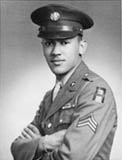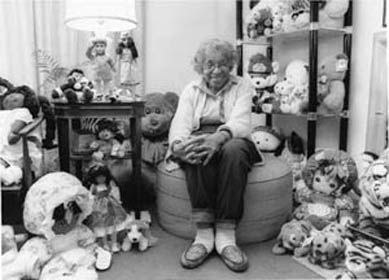Waverly B. Woodson Jr.,
Army Medic Corporal, 1942–1945;
Army Reserves Sergeant, 1945–1952

D-day was the turning point of World War II. The allies stormed the beaches of Normandy, France, in the largest seaborne attack ever. About 150,000 men took on Hitler’s army with one goal—to drive the enemy back to Berlin. But the Allies were under relentless attack from the shore. Close to eleven thousand were killed or declared missing in action. Many never made it out of the water.
Waverly Woodson was an Army medic with the 320th Antiaircraft Barrage Balloon Unit, an all-black group that saw action on D-day. Although on that day he was dubbed by the black media as “Hero No. 1,” before long, Woodson said, he was forgotten. And most people don’t even know that he and more than a thousand other black men were at D-day.
If you ever want to know what hell is like, D-day was it.
I was on what they call a landing craft, which is a ship that carries troops, vehicles, and supplies onto the shore. I was in the back of the first wave, and what I saw in front of me was death. All these men, thousands and thousands of men, were heading onto the beach, and the Germans were just shooting them down. Mortars and shells were hitting boats. There were a lot of dead bodies floating in the water. On the other boats around me, you could see men getting seasick one minute and the next minute they were in the water, dead.
Our ship ran over a submerged mine and then the Germans started shooting at us. Next thing you know a shell hits us on the right side and it blew up all of our vehicles except a tank, and killed fifty-five guys. The only ones that made it were me and two other guys, but I was hit in the back and groin. What was left of our landing ship tank (LST) was just floating along. And then another shell struck it and I was thrown in the water. There was a lot of debris and men were drowning all around me. I swam to the shore and crawled on the beach to a cliff out of the range of the machine guns and snipers.
I was far from where I was supposed to be, but there wasn’t any other medic around here on Omaha Beach. It was just about ninety minutes after the start of D-day. I had pulled a tent roll out of the water and so I set up a first-aid station. It was the only one on the beach.
Bullets and shells were flying everywhere. It seemed like everybody was either dead or screaming, “Doc, Doc, help me.” I took a bullet from the shoulder of one, and dressed the gaping hole in the shoulder of another. I even amputated a right foot.
At one point I heard all this shouting coming from the sea. There were thirty Tommies [the nickname for British soldiers] drowning, so I waded in and dragged out four of them and gave them artificial respiration and revived them. Then I told other guys what to do so they could save the other men.
They say I saved three hundred men but I couldn’t tell you how many. The newspaper articles I got here says I worked thirty hours after being hit, but I can’t remember. I just know it was a long time. After saving those Tommies, I collapsed. I think I had lost too much blood, even though I had wrapped up my wound.
They put me in the hospital for two days but I had to go back; I wanted to go back, I don’t know why, I just did. So I went back for another twelve hours on D-day plus four and worked until I was so exhausted I just couldn’t do no more.
After the war I would have gone to Korea but I was in love with Joann and we had just got married. She didn’t want me to go. So I worked at Walter Reed Army Hospital in Washington, D.C., as the sergeant in charge of the morgue. I did autopsies. We raised our family. I got two girls and a boy. We got lots of land here in Clarksburg, Maryland, and we’re happy.
When you talk to white people they will swear up and down that there were no black people in the first wave, but I went in without my unit. I was put on another LST. I’m very light-skinned and a lot of the men thought I was white. Newspaper articles say that the War Department sat on my commendation. They finally gave a Medal of Honor to some black men who served in World War II, way after the fact.* I did get a Purple Heart† and a Bronze Star.‡ Joann, my wife, made a display case for it and we hung it up near the door.
On the fiftieth anniversary of D-day the French government recognized me. It sent three of us on a weeklong, all-expenses paid trip to France, where they gave me a medal during a ceremony on Omaha Beach. I don’t know why they chose me, but it was a wonderful thing. I was the only black man of the three. I think it was the French’s way of saying, “Thanks.”
